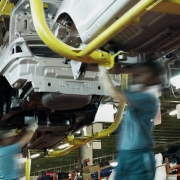How A New Tax on Sugary Drinks Ruined a Beloved UK Soda
While I was scrolling through Facebook the other day, I came across an article from Vice that caused me to do a double-take. Published in Vice “Munchies,” section the article was titled, “The Sugar Tax Killed Rubicon and I’m Not Ok.”
In most any other instance, I would have paid no serious attention to this post and continued scouring my newsfeed in search of more interesting posts. But Vice is not usually the most critical of arbitrary taxation. And yet, here was an article that, at least from its face value, was criticizing the new UK tax on sugar. I was intrigued.
However, what I read was not as critical as I had hoped. In fact, even though the UK’s soda tax was to blame for “killing” the writer’s favorite soda, the author seemed to think capitalism was to blame.
The author was angry. In need of quenching her thirst, she had stumbled into a convenience store after attending a music festival late one night, in search of a Rubicon, a sugary soft drink popular in the UK. But as soon as she took a drink, it was apparent that something was wrong. The drink did not taste like it usually did. It wasn’t nearly as sweet. And after a few moments of contemplation, reality set in: Rubicon was a victim in the government’s new war on sugar.
The Sugar Tax
Following the lead of many U.S. cities, the UK recently instituted a new tax targeted at fighting obesity. The new tax seeks to penalize the makers of sugary drinks by levying a tax on beverages that exceed the new sugar restrictions.
Explaining the new sugar limitations, the BBC writes:
“Drinks with more than 8g per 100ml will face a tax rate equivalent to 24p per liter.
Those containing 5-8g of sugar per 100ml will face a slightly lower rate of tax, of 18p per liter.
Pure fruit juices will be exempt as they do not carry added sugar, while drinks with a high milk content will also be exempt due to their calcium content.”
The goal of this new tax is to fight obesity by discouraging both soft drink manufacturers and consumers from purchasing beverages with high sugar levels. This was originally expected to generate over $500 million annually for the state, but this projection has since been changed to $240 million since many companies have now altered their recipes to include less sugar in order to avoid the tax. The revenue generated from the new tax will be given to schools to invest in their own physical education programs as well as breakfast clubs that provide healthy meals to children.
However, it is also still unclear who will get stuck paying for the new tax. For manufacturers who do not choose to alter their formulas, they can either choose to accept the financial burden themselves, or pass it on to the consumer.
Either way, even those who usually support taxation are not happy with the consequences of this new law, as the recent Vice article shows. Unfortunately, the anger is being directed at the wrong culprit.
Capitalism is Not the Bad Guy
Before the author begins to explain her disappointment with the new sugar law, she opens up her piece by saying:
“I do not object, in theory, to the idea of reducing sugar consumption—a food acknowledged to contribute to obesity, and subsequently, heart disease and diabetes. I also back this kind of regulation if done correctly, as I am happy for companies (not consumers) to foot the tax bill for a better welfare system, when poverty is the real cause of obesity, not sugar.”
In theory, many things sound like a good idea. Providing all homeless people with homes, for example, doesn’t seem like a bad idea. However, if in order to get the money to fund this program you are taxing job creators, there is a real problem. And while this sounds rather far-fetched, this is an actual law about to go into effect in Seattle, Washington.
Forcibly taking money from one source in order to give it to another is not benevolence, no matter how great the cause in question may be. And while many leftists do not agree with this premise, they also do not like when their favorite products are altered thanks to taxation.
As the author continues:
“..If I must suffer through capitalism, then I want the small joys that come with it. I want identikit experiences that I can recreate wherever I am, in the form of branded food and drink.”
Yet, while the author’s real issues lie with the government for implementing this new tax, she seems overly eager to blast capitalism instead. Throughout the article, the free market routinely gets thrown under the bus. In fact, the author even goes out of her way to blame the parent company of Rubicon, AG Barr, for making this decision, completely neglecting to account for the fact that the UK government enacted this new tax, not the capitalist bogeyman.
“AG Barr has taken away a certainty in my life. It has betrayed my trust, and for that, I will never forgive it,” she says. And yet, while the author is not a fan of capitalism, her commentary on the soda tax actually proves why the free market is so great.
The government doesn’t really care about your feedback. And in all honesty, they don’t have to. When you operate by force you do not have to cater to the demands of your constituents. But the market has to respond to this demand or they will lose business. Of course, they may just lose business anyway if the government passes a tax as egregious as this one.
And since many consumers were as equally unhappy with the new formula as the author of this Vice article, Rubicon has already responded to this demand by reworking the recipe.
“For our Rubicon exotic fruit juices, we worked closely with drinkers to understand their needs and taste preferences to develop the new range with something for everyone…We introduced Rubicon Deluxe, a richer and more indulgent product. Rubicon Deluxe has a higher sugar level than regular Rubicon, so it’s more suited to special occasions.”
Unfortunately, this is not an isolated incidence. Too many people are too quick to blame capitalism without fully understanding why. And as for the author of this piece, hopefully, she realizes that the government, and not the market is to blame for the death of her favorite soft drink.












